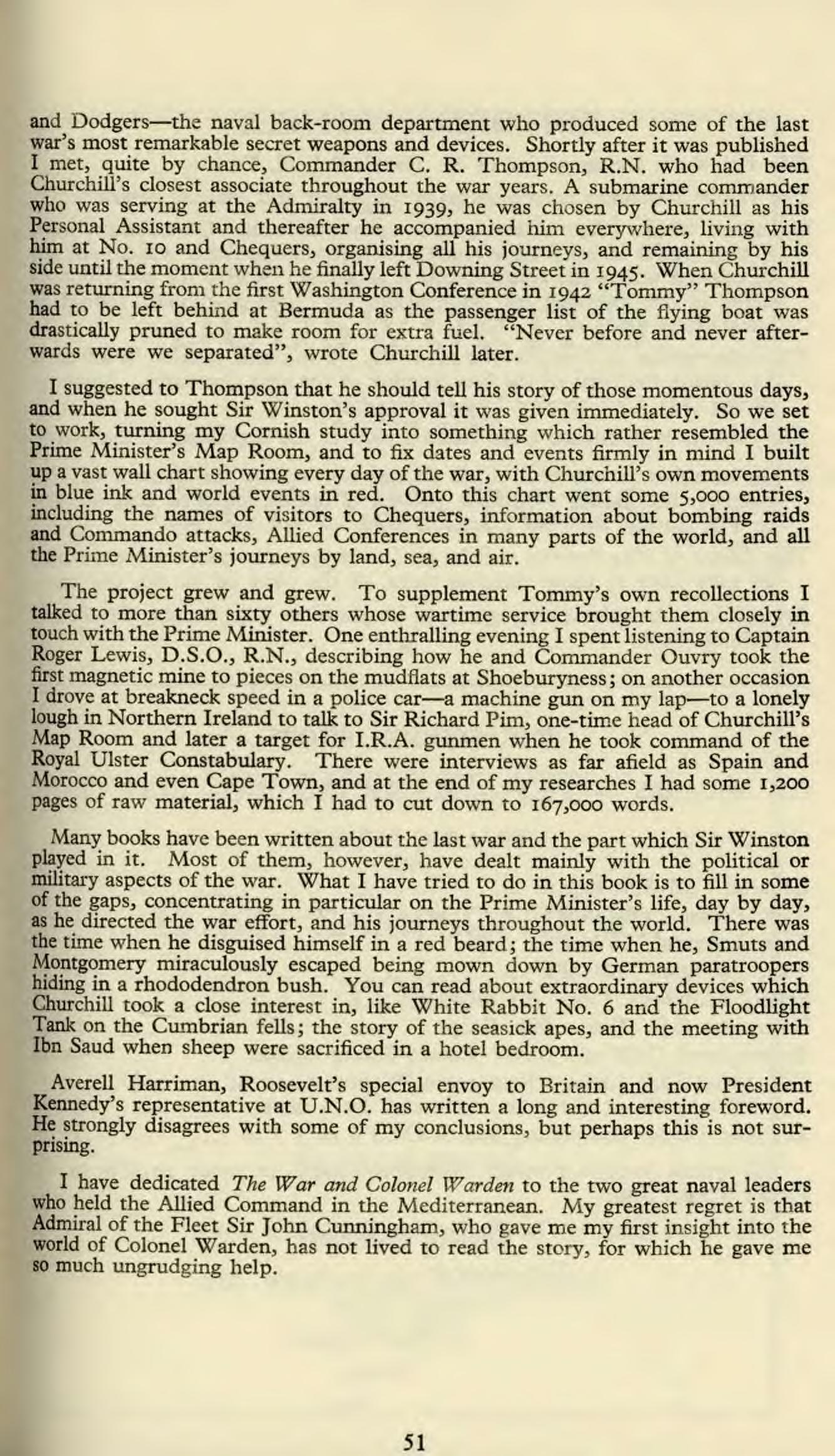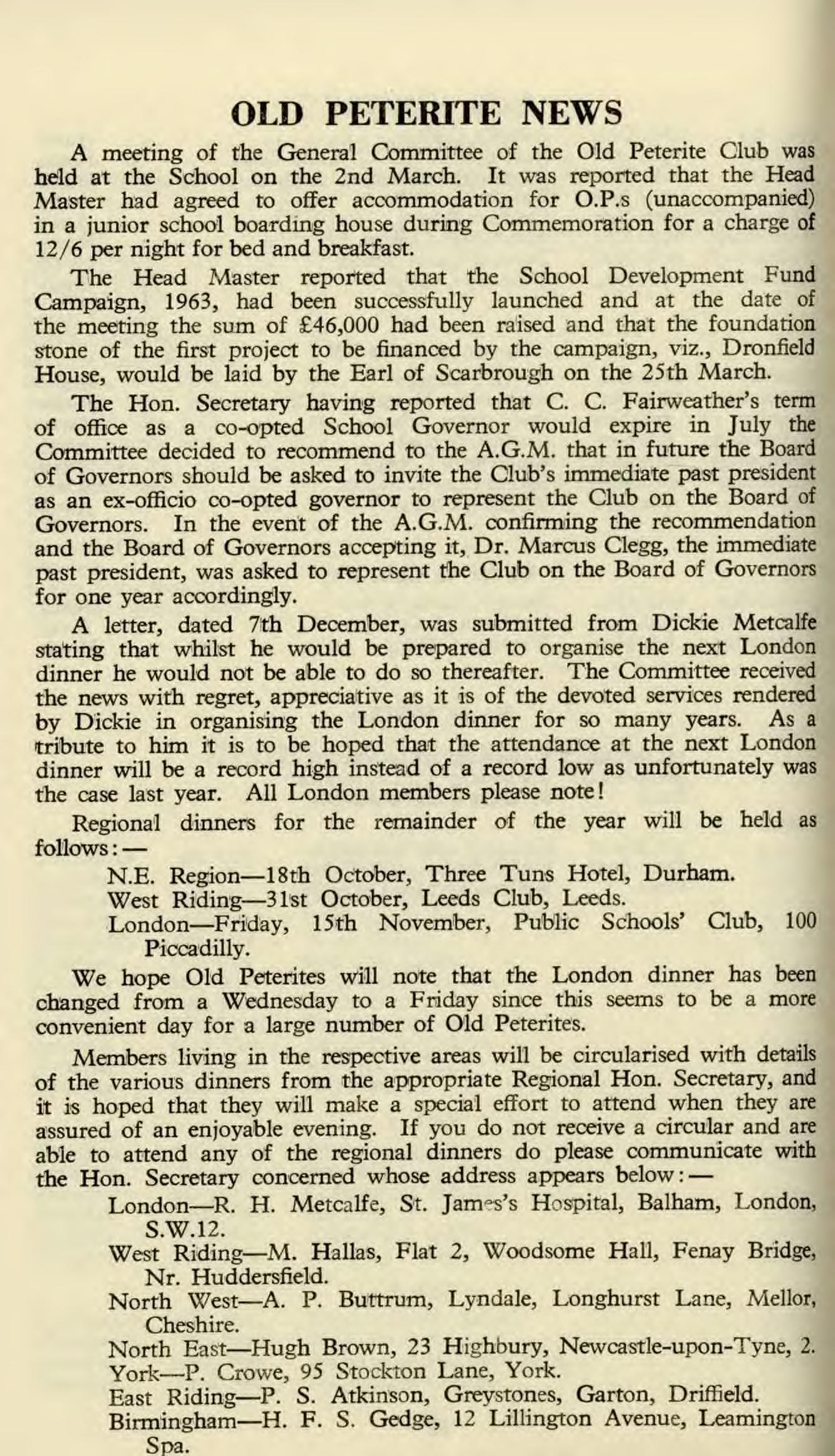
29 minute read
Old Peterite News
from May 1963
by StPetersYork
A meeting of the General Committee of the Old Peterite Club was held at the School on the 2nd March. It was reported that the Head Master had agreed to offer accommodation for O.P.s (unaccompanied) in a junior school boarding house during Commemoration for a charge of 12/6 per night for bed and breakfast.
The Head Master reported that the School Development Fund Campaign, 1963, had been successfully launched and at the date of the meeting the sum of £46,000 had been raised and that the foundation stone of the first project to be financed by the campaign, viz., Dronfield House, would be laid by the Earl of Scarbrough on the 25th March.
The Hon. Secretary having ieported that C. C. Fairweather's term of office as a co-opted School Governor would expire in July the Committee decided to recommend to the A.G.M. that in future the Board of Governors should be asked to invite the Club's immediate past president as an ex-officio co-opted governor to represent the Club on the Board of Governors. In the event of the A.G.M. confirming the recommendation and the Board of Governors accepting it, Dr. Marcus Clegg, the immediate past president, was asked to represent the Club on the Board of Governors for one year accordingly.
A letter, dated 7th December, was submitted from Dickie Metcalfe stating that whilst he would be prepared to organise the next London dinner he would not be able to do so thereafter. The Committee received the news with regret, appreciative as it is of the devoted services rendered by Dickie in organising the London dinner for so many years. As a tribute to him it is to be hoped that the attendance at the next London dinner will be a record high instead of a record low as unfortunately was the case last year. All London members please note!
Regional dinners for the remainder of the year will be held as follows: — N.E. Region-18th October, Three Tuns Hotel, Durham. West Riding-31st October, Leeds Club, Leeds. London—Friday, 15th November, Public Schools' Club, 100 Piccadilly.
We hope Old Peterites will note that the London dinner has been changed from a Wednesday to a Friday since this seems to be a more convenient day for a large number of Old Peterites.
Members living in the respective areas will be circularised with details of the various dinners from the appropriate Regional Hon. Secretary, and it is hoped that they will make a special effort to attend when they are assured of an enjoyable evening. If you do not receive a circular and are able to attend any of the regional dinners do please communicate with the Hon. Secretary concerned whose address appears below :— London—R. H. Metcalfe, St. James's Hospital, Balham, London, S.W.12. West Riding—M. Hallas, Flat 2, Woodsome Hall, Fenay Bridge, Nr. Huddersfield. North West—A. P. Buttrurn, Lyndale, Longhurst Lane, Mellor, Cheshire. North East—Hugh Brown, 23 Highbury, Newcastle-upon-Tyne, 2. York—P. Crowe, 95 Stockton Lane, York. East Riding—P. S. Atkinson, Greystones, Garton, Driffield. Birmingham—H. F. S. Gedge, 12 Lillington Avenue, Leamington Spa.
Commemoration, 1963—O.P.s are reminded that Commemoration weekend will be from Friday, 26th July, to Sunday, 28th July, the programme for which is circulated with this issue of "The Peterite". The organisers of the O.P. teams for the sporting events are as follows: — Cricket—K. M. Ratcliff, Westlyn, Thorpe Lane, Tealby, Lincs. Tennis—C. H. Lewis, 15 Longfield Avenue, Mill Hill, London, N.W.7. Golf—P. Crowe, 95 Stockton Lane, York.
Old Peterites are reminded that the President of the Club will, as is customary at Commemoration, lay a wreath on the Memorial Shrine in the Ante-Chapel at 10-30 a.m. on Saturday, 27th July, and it is hoped that O.P.s attending Commemoration will accompany him.
Mr. Le Tocq would be glad to hear from any O.Ps. who could repre-
sent the School in the "Ashburton Supporters" Match at Bisley on Wednesday, 24th July, at 3-45 p.m. Teams of four (any number) fire three sighters and seven counting shots at 500 yards, but no one may shoot who has competed in the main Bisley meeting. Rifles, telescopes, etc., will be provided.
It will be sufficient if Mr. Le Tocq is informed by 7th July.
THE NORTH WEST AREA OLD PETERITES
The Annual Dinner was held on Friday, 8th March, 1963, at the Old
Nag's Head Hotel, Jackson's Row, Manchester, when the following Old
Peterites attended: —M. J. Baddeley (The Grove, 1947-55), W. D. Blackburn (The Rise, 1922-31), A. T. Booth (The Manor, 1948-53), J. G. Booth (The Manor (1946-50), G. R. Cormack (The Rise, 1950-58), S. T. Dutton (The Grove, 1951-59), P. Goolden (The Manor, 1951-56), M. Hallas (School House, 1943-47), J. A. Hanson (School House, 1918-21), T. J. Lewis (The Rise, 1923-26), A. B. Maclldowie (The Rise, 1927-31), A. W. Martin (School House, 1956-60), R. F. S. Mervyn (The Manor, 1924-27), T. C. Rainford (The Rise, 1953-60), R. A. Stratton (School House/The
Manor, 1935-43), P. L. Bardgett (The Grove, 1950-55).
Apologies were received from : —The Headmaster, Dr. M. T. Clegg, D. Norwood, Dr. G. E. L. Graham, Dr. R. Ogley, C. W. Thompson, G. Douglas, J. H. Moss, The Ven. H. N. Hodd.
The toast to "The School" was proposed by T. C. Rainford.
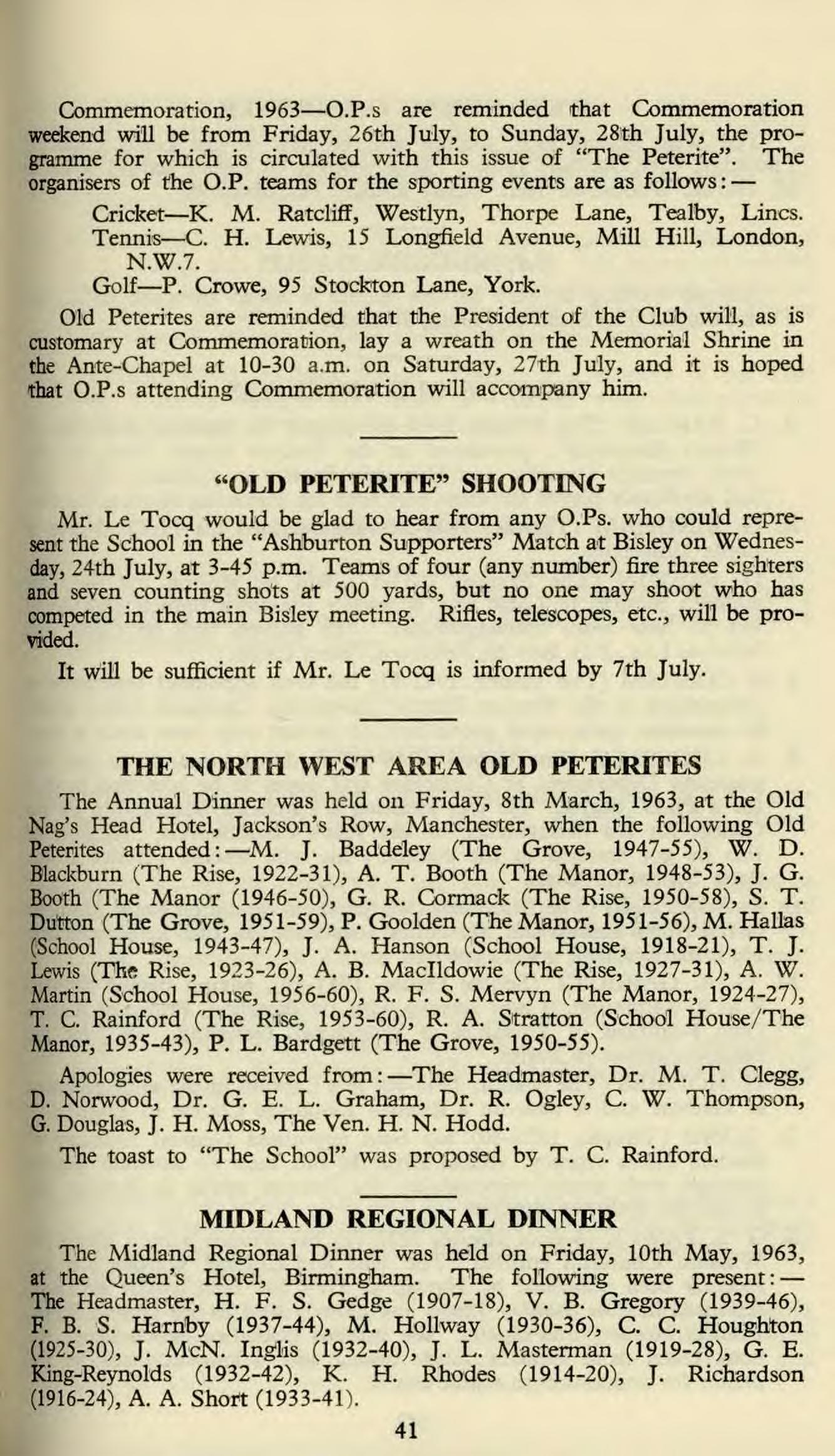
MIDLAND REGIONAL DINNER
The Midland Regional Dinner was held on Friday, 10th May, 1963, at the Queen's Hotel, Birmingham. The following were present : —The Headmaster, H. F. S. Gedge (1907-18), V. B. Gregory (1939-46), F. B. S. Harnby (1937-44), M. Hollway (1930-36), C. C. Houghton (1925-30), J. McN. Inglis (1932-40), J. L. Masterman (1919-28), G. E.
King-Reynolds (1932-42), K. H. Rhodes (1914-20), J. Richardson
(1916-24), A. A. Short (1933-41).
WEST RIDING O.P. DINNER
The West Riding O.P. Dinner will be held at the Leeds Club on Thursday, 31st October, 1963. Those wishing to attend should write to M. Hallas, Woodsome Hall, Fenay Bridge, Huddersfield.
O.P. RUGGER MATCH
Anyone wishing to play in this match is asked to write to C. W. Thompson, 22 The Meadway, Dore, Sheffield.
NEWS OF OLD PETERITES
A. C. BARKER (The Manor, 1947-49) played the leading male role in "King's Rhapsody", performed at the Theatre Royal, York, by the
York Amateur Operatic and Dramatic Society in January, 1963. He had previously played the same part with the Pickering Musical Society. R. G. BINGHAM (Temple, 1949-56) has obtained his Ph.D. degree at
Leeds University. J. D. BREWIN (The Manor, 1953-57) will be serving for the next eighteen months in Cable and Wireless's Freetown branch and would like to hear from contemporaries. His address will be Cable and
Wireless Ltd., P.O. Box 80, Freetown, Sierra Leone. I. G. COBHAM (The Manor, 1942-51) has been appointed Instructor in
Anaesthesia at the Western Reserve University, Cleveland, Ohio, which he considers quite rapid promotion, as he has only been there a year. P. A. CROSSLEY (The Grove, 1948-59) is doing research in the Engineering Department at Cambridge and hopes to be admitted to read for a Ph.D. degree. He was awarded a Batchelor Scholarship by his
College for his performance in last year's examinations. In spite of this he got married in the summer; his wife teaches Physics at the
Perse School for Girls. G. R. FORTUNE (The Rise, 1948-52) has been appointed Local Manager of the North British and Mercantile Insurance Co. Ltd. in Shrewsbury.
He is married with a son aged two. M. G. A. GARBUTT (School House, 1951-59), having passed through
R.M.A. Sandhurst, is now serving with 1st Battalion, Prince of Wales's
Own Regiment of Yorkshire at Wuppertal, Germany. In June the battalion moves to Berlin. D. H. HOLMES (The Manor, 1942-50) is a Captain in the same regiment as Garbutt and is now on a Russian Language Course in England. G. LONG (Temple, 1935-40) has been appointed General Manager of
Reuters News Agency. Since 1960 he had been an assistant general manager with special responsibility for Reuters' affairs in Europe. He is married with five children. S. G. S. PAWLE (School House, 1927-31) has written a book about Sir
Winston Churchill entitled "The War and Colonel Warden"; it has recently been published by Harrap at 35/-, has been widely reviewed, serialised in The Sunday Times and already sold to the United States,
France, Norway and Spain. We publish below an article about the book taken from Smith's Trade News, with acknowledgment to the
Editor for permission to reproduce. 42
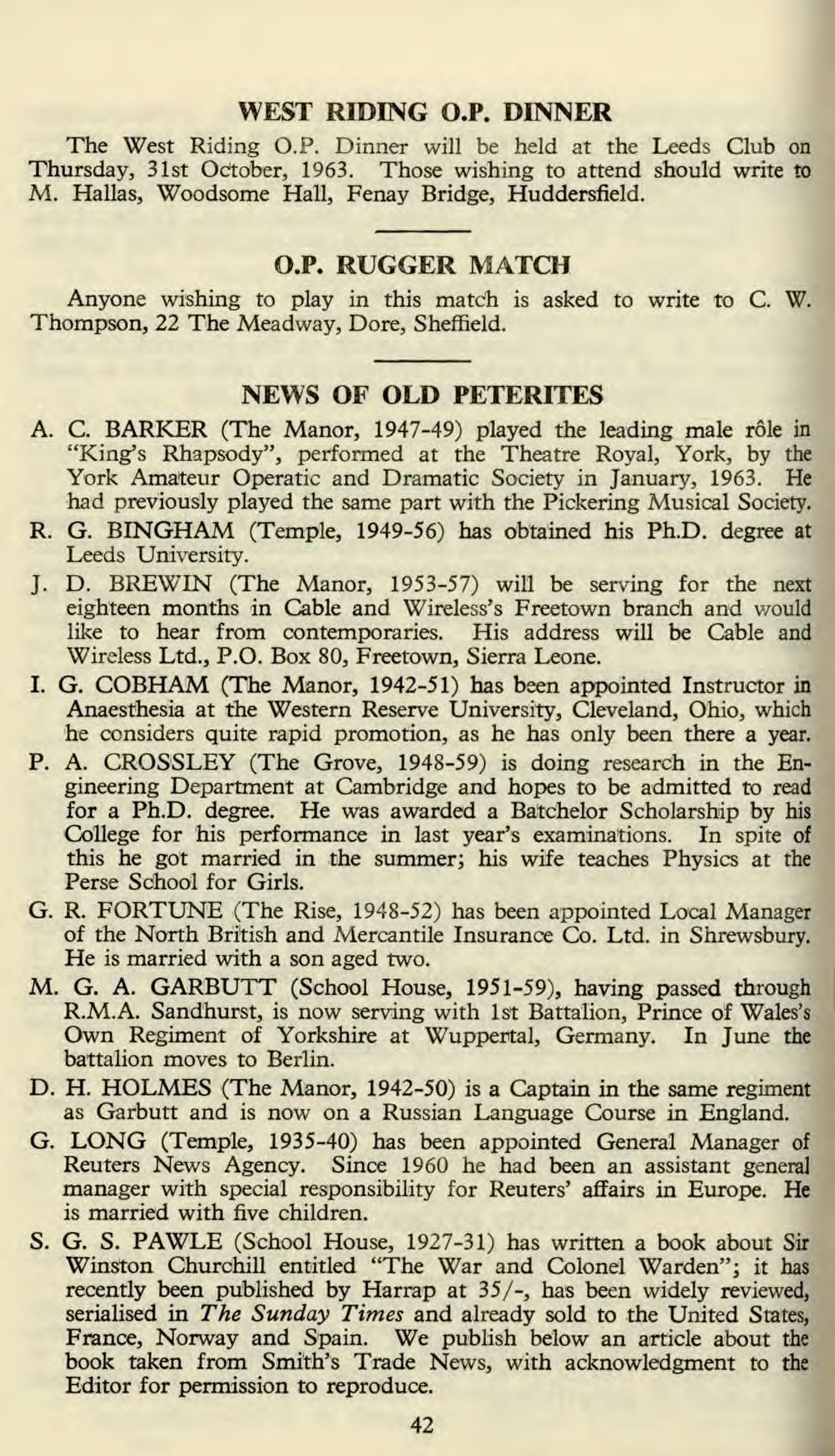
E. W. TREVELYAN (The Rise, 1952-57) is to be one of the two representatives appointed by the Archbishop of York from the Northern
Province at the Anglican Congress to be held in Toronto in August.
One of the York Diocesan delegates will be Mr. D. A. C. Blunt, now a Housemaster at Scarborough College. P. B. WILSON (The Manor, 1944-54) is now a partner in the firm of
R. L. Frank and Catlin, Solicitors, in Truro. He served his articles with Sir Lumley Dodsworth in York and did his National Service in the R.A.F., in which he obtained a commission and served in the
Legal Branch, mainly in Aden and at the Air Ministry. K. YUNIBANDHU (School House, 1959-61) is a member of the Thai
Free Students' League and helps to organise mass demonstrations against American intervention in his homeland.
GOLDEN WEDDING
PICKERING—BRUNDELL. On 2nd April, 1913, at St. George's
Church, Doncaster, by the Lord Bishop of Beverley, Basil Henry
Pickering to Alice Elizabeth Brundell. Address now: Kirke's Orchard,
East Markham, Newark, Notts. (1902-04.)
ENGAGEMENTS
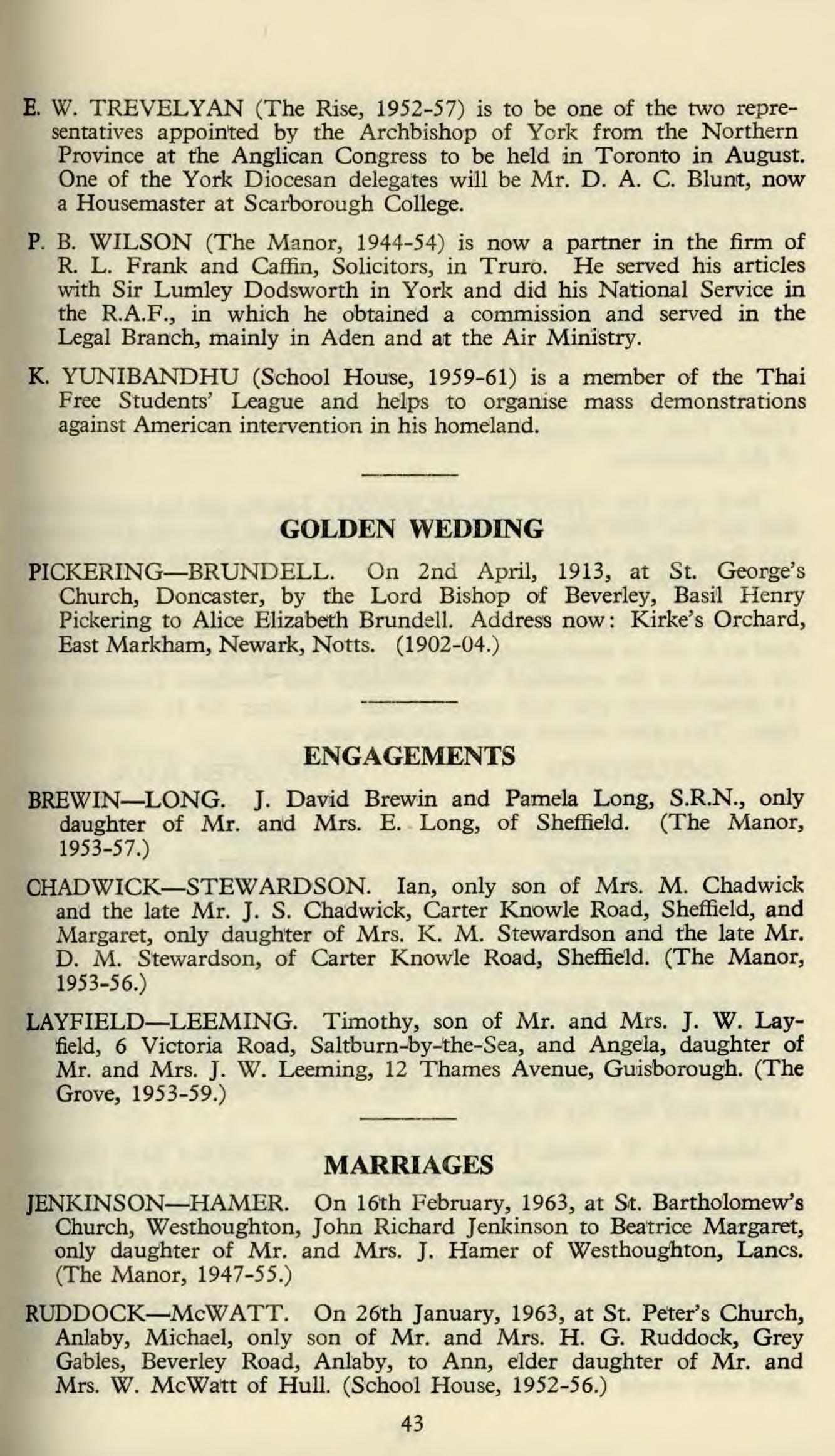
BREWIN—LONG. J. David Brewin and Pamela Long, S.R.N., only daughter of Mr. and Mrs. E. Long, of Sheffield. (The Manor, 1953-57.) CHADWICK—STEWARDSON. Ian, only son of Mrs. M. Chadwick and the late Mr. J. S. Chadwick, Carter Knowle Road, Sheffield, and
Margaret, only daughter of Mrs. K. M. Stewardson and the late Mr.
D. M. Stewardson, of Carter Knowle Road, Sheffield. (The Manor, 1953-56.) LAYFIELD—LEEMING. Timothy, son of Mr. and Mrs. J. W. Layfield, 6 Victoria Road, Saltburn-by-the-Sea, and Angela, daughter of
Mr. and Mrs. J. W. Leeming, 12 Thames Avenue, Guisborough. (The
Grove, 1953-59.)
MARRIAGES
JENKINS ON—HAMER. On 16th February, 1963, at St. Bartholomew's
Church, Westhoughton, John Richard Jenkinson to Beatrice Margaret, only daughter of Mr. and Mrs. J. Hamer of Westhoughton, Lancs. (The Manor, 1947-55.) RUDDOCK—McWATT. On 26th January, 1963, at St. Peter's Church,
Anlaby, Michael, only son of Mr. and Mrs. H. G. Ruddock, Grey
Gables, Beverley Road, Anlaby, to Ann, elder daughter of Mr. and
Mrs. W. McWatt of Hull. (School House, 1952-56.) 43
BIRTH
COBHAM.—On 17th January, 1963, to Brenda, wife of Ian Cobham, a daughter (Kristina Ann). (The Manor, 1942-51.)
THE PUBLIC SCHOOLS' OLD BOYS' GOLFING ASSOCIATION
This Association has now been brought officially into being and St. Peter's, York, is amongst the first Public Schools to become full members of the Association.
Each year the "GRAFTON-MORRISH" Trophy will be competed for and the final this year has been fixed to be played over the Hunstanton and Royal West Norfolk, Brancaster, Clubs, on Friday to Sunday, 25th to 27th October, 1963.
Forty-three Member Societies are competing for the 32 places in the final so it will be necessary to hold Regional Qualifying rounds. St. Peter's are placed in the combined West Midlands and Northern Divisions with 14 other schools who will compete with each other for 11 places in the final. The other schools in this division are :—
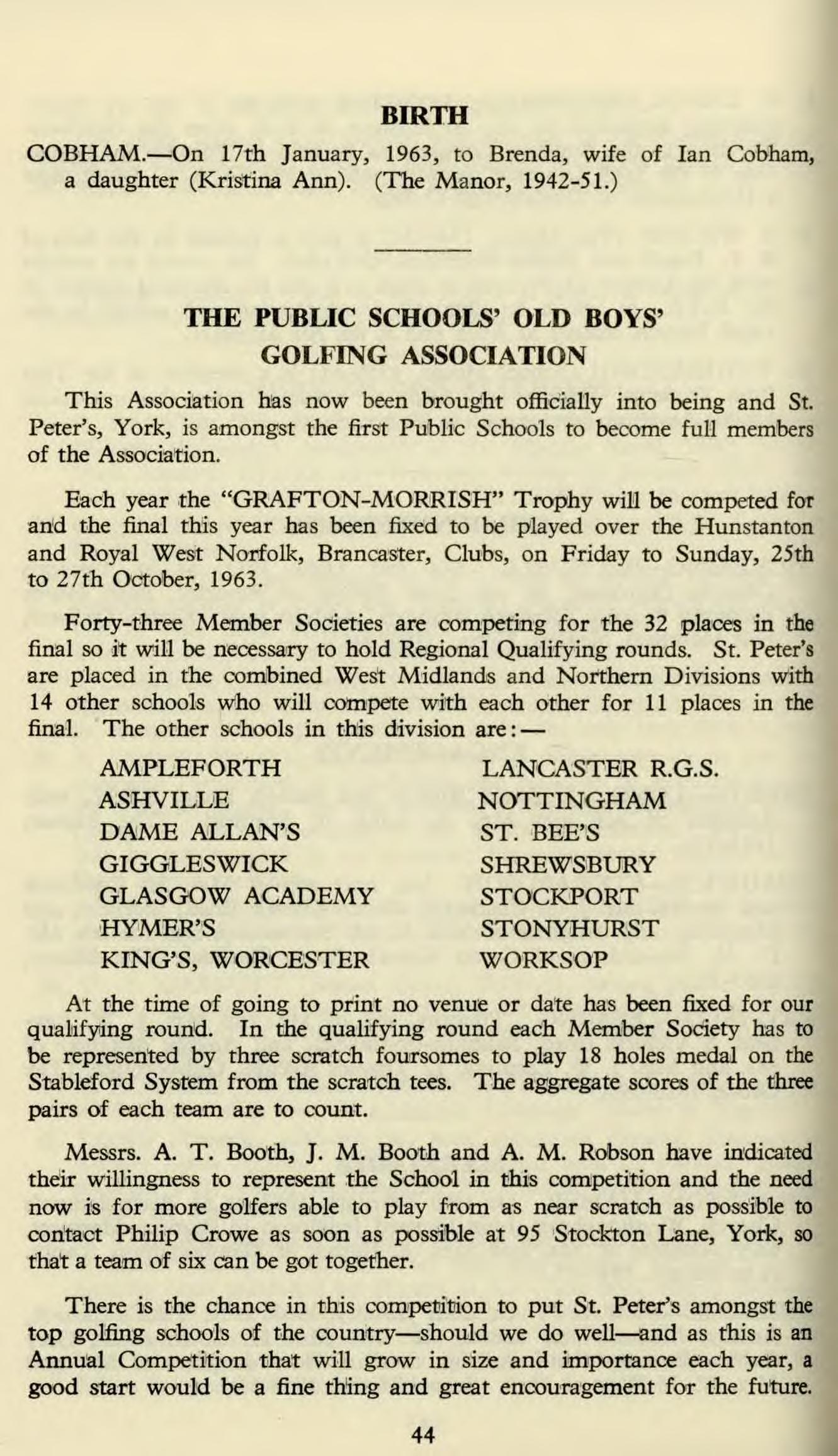
AMPLEFORTH
LANCASTER R.G.S. ASHVILLE NOTTINGHAM DAME ALLAN'S ST. BEE'S GIGGLESWICK SHREWSBURY GLASGOW ACADEMY STOCKPORT HYMER'S STONYHURST KING'S, WORCESTER WORKSOP
At the time of going to print no venue or date has been fixed for our qualifying round. In the qualifying round each Member Society has to be represented by three scratch foursomes to play 18 holes medal on the Stableford System from the scratch tees. The aggregate scores of the three pairs of each team are to count.
Messrs. A. T. Booth, J. M. Booth and A. M. Robson have indicated their willingness to represent the School in this competition and the need now is for more golfers able to play from as near scratch as possible to contact Philip Crowe as soon as possible at 95 Stockton Lane, York, so that a team of six can be got together.
There is the chance in this competition to put St. Peter's amongst the top golfing schools of the country—should we do well—and as this is an Annual Competition that will grow in size and importance each year, a good start would be a fine thing and great encouragement for the future.
O.P. GOLF COMPETITION—SUNDAY, 28th JULY, 1963
It is hoped that the O.P. Golf Competition for the "BURNETT" Trophy can be played as usual over the York Golf Club's course at Strensall, near York. At the time of going to print it has not been possible to arrange finally all the details but if all goes as in previous years then the competition will be held on the above date starting at 2-0 p.m.
The entry last year was the largest that has taken the field and it is hoped that the number can be increased this year. Would all O.P.s who would like to play please write to :
P. Crowe, "Sunnyside", 95 Stockton Lane, York.
stating their handicaps. When all arrangements are completed competitors will be written to individually.
THE OXFORD LETTER
Oxford, Hilary, 1963.
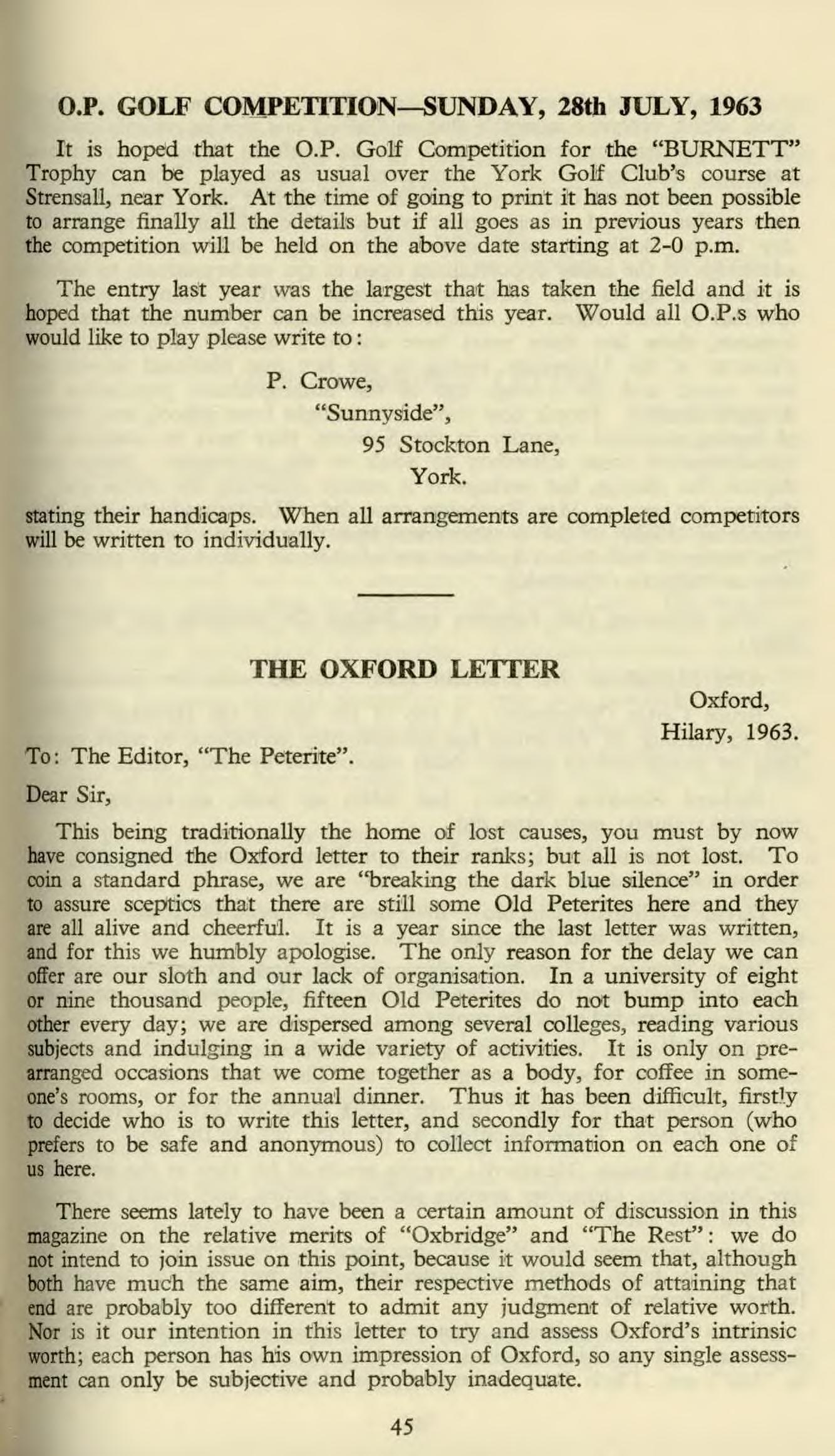
To: The Editor, "The Peterite". Dear Sir,
This being traditionally the home of lost causes, you must by now have consigned the Oxford letter to their ranks; but all is not lost. To coin a standard phrase, we are "breaking the dark blue silence" in order to assure sceptics that there are still some Old Peterites here and they are all alive and cheerful. It is a year since the last letter was written, and for this we humbly apologise. The only reason for the delay we can offer are our sloth and our lack of organisation. In a university of eight or nine thousand people, fifteen Old Peterites do not bump into each other every day; we are dispersed among several colleges, reading various subjects and indulging in a wide variety of activities. It is only on prearranged occasions that we come together as a body, for coffee in someone's rooms, or for the annual dinner. Thus it has been difficult, firstly to decide who is to write this letter, and secondly for that person (who prefers to be safe and anonymous) to collect information on each one of us here.
There seems lately to have been a certain amount of discussion in this magazine on the relative merits of "Oxbridge" and "The Rest": we do not intend to join issue on this point, because it would seem that, although both have much the same aim, their respective methods of attaining that end are probably too different to admit any judgment of relative worth. Nor is it our intention in this letter to try and assess Oxford's intrinsic worth; each person has his own impression of Oxford, so any single assessment can only be subjective and probably inadequate.
Oxford affects different people in different ways, but the one thing upon which everyone agrees is that in Oxford one can be entirely oneself: there is no pressure exerted upon one to conform to any conventional pattern. Reactions to this unexpected freedom vary from person to person; some throw off every inhibition in their first year and acquire new ones in their second; others retreat into academic oblivion and spend every day in the Bodleian; most spread their wings with caution and take advantage of the many opportunities open to the undergraduate to indulge in peculiar sports and particular interests. Oxford changes every individual to some degree ( I ), and is itself changed by its inhabitants. For instance, these last three years have shown a marked alteration in the character of the University, owing to the fact that National Service has now ceased and the average age of the undergraduate population has dropped sharply. People now come here straight from school, and, instead of having acquired maturity in the Services, they have to complete the transformation from schoolboy to adult in the university. Many dons deplore the change, but perhaps it is merely restoring the status quo, so that we can say, as Max Beerbohm once did: "Undergraduates owe their happiness chiefly to the consciousness that they are no longer at school. The nonsense which was knocked out of them at school is all gently put back at Oxford or Cambridge".
The following Old Peterites are having the nonsense put back into them:
Alex McCallum (St. Edmund Hall): toured with the Greyhounds.
Bruce Carter (Worcester): is top of the bill at the Heritage Society. His strumming on the guitar has brought him invitations to more parties than he would like to admit. Man cannot live by bread alone.
Richard Hawkins (Keble): has taken up judo, as rowing is not energetic enough: mens sana, etc.
David Brown (Keble): already a typical businessman—Law, golf, and dark suit on Sundays.
David Wightman (Lincoln): lives near the Regal, in Cowley. "Must see how the other half lives, you know."
John Hemsley (Trinity): plays hockey and cricket successfully; arranged a very good dinner for the O.Ps and then sent us an enormous bill. Has absconded with the profits.
Martin Pickard (Worcester): gained a distinction in Law Moderations, known (by those who did not get one) as "The kiss of death".
Chris Marsay (Trinity): has the oldest scout in Oxford, who is still too fast for him. Enjoys yachting, as the wind can do the work.
David Shubrook (Hertford): spends much of his time at the notorious Air Squadron. Organises riotous staircase parties, and wants to revive the Hell Fire Club.
John Armstrong (St. Peter's): has been in France for the last year, but will no doubt return in October and drop wet rags on to people's heads (his favourite sport).
Other 0.P.s in residence, about whom your correspondent has been unable to fmd anything original to say (that is printable, anyway, except in "Isis") are: Chris Jose (Worcester), David Lavender (Worcester), John 46
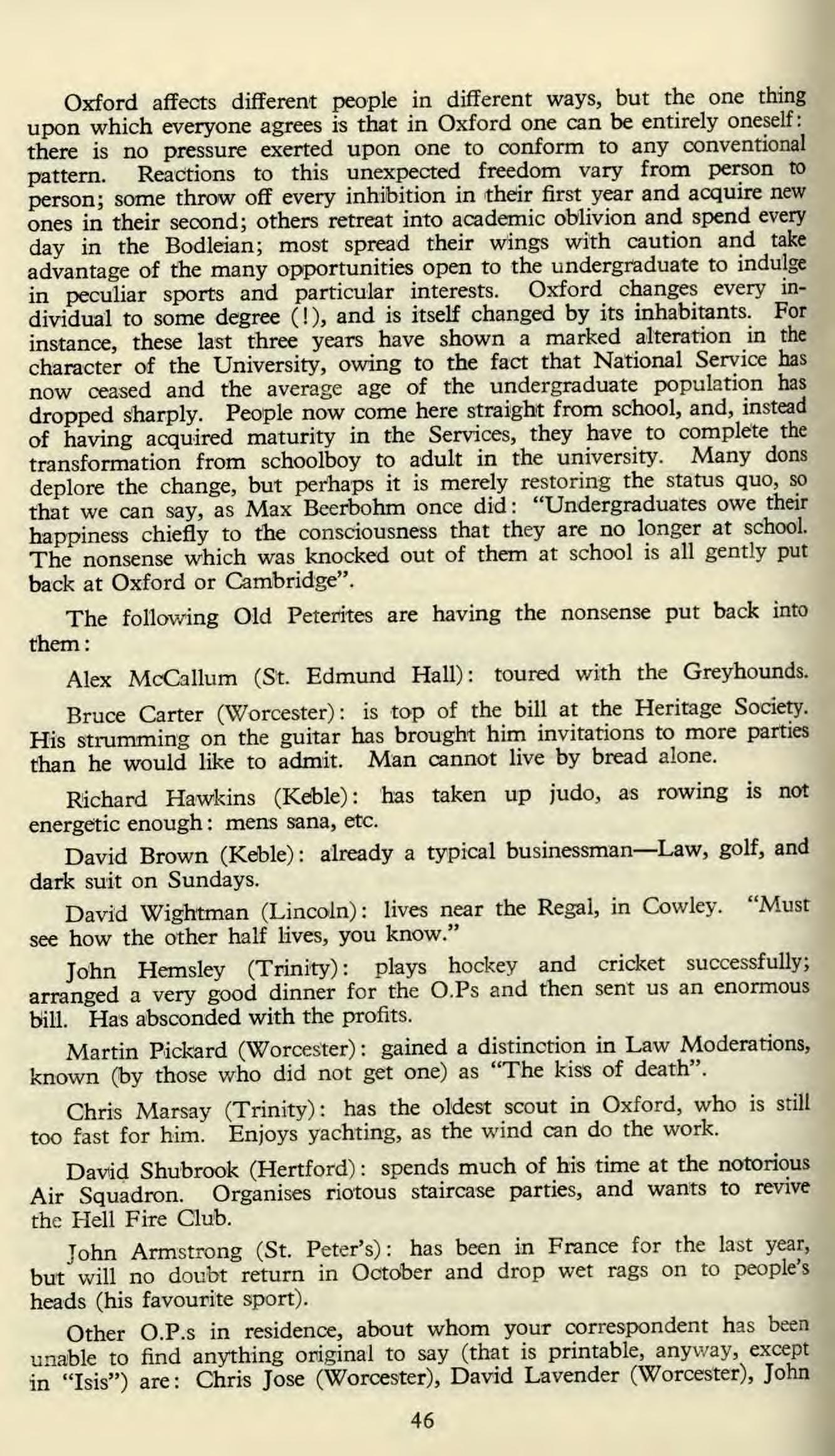
Fairclough (St. John's), Chris Spencer (St. Edmund Hall), Cohn Brown (St. Edmund Hall) and John Williams (St. Edmund Hall).
In conclusion we would like to congratulate those Peterites who will be joining us in October, and to hope that the School will continue to maintain our numbers here!
Yours sincerely, THE OXFORD OLD PETERITES.
THE CAMBRIDGE LETTER
Cambridge,
March, 1963.
The Editor, "The Peterite". Dear Sir,
This term the weather has played havoc with the traditional sporting activities. Plans for the Lent Races, and for the Rugby, Soccer and Hockey "Cuppers" had to be abandoned. Frustrated sportsmen sought consolation in skating and ice-hockey on the frozen Cam. The less hardy waited patiently for the ice and snow to melt to enable them to engage in the more pladid sport of punting. Conscience-stricken examinees cloistered themselves in libraries and studies, whilst the more reckless, and the more fortunate, devoted themselves to their own particular interest.
In these very sketchy pen-pictures we have attempted to tell you something of what O.Ps. are doing here. We hope they may reflect the "infinite variety" of life here, but we realise they can only hint at the finer points of Cambridge life.
T. D. F. Anderson (Selwyn). Long-haired, unpredictable theologian, hardly identifiable beneath dark glasses. Moves almost exclusively in a circle of rich and influential Indians. Works hard, punts, attends wrestling matches and Little St. Mary's. Secretary of Cambridge Church Union.
E. S. Bolton (St. Catharine's). Member of the Yorkshire Society.
R. G. Bruce (Emmanuel). Sports magnificent—if somewhat flashybow-ties. Also wears dark glasses (necessity?). Attends Union Debates. Sells a magazine—about which your correspondent is unfortunately ignorant. Prominent in the Emmanuel Rugby Club's out-of-season social activities.
A. N. P. Butland (St. Catharine's). An engineer with strong military tendencies (including moustache). Says he may join the Army Intelligence after graduation. Oblivious to all sporting activities.
P. Collins (St. John's). Argues with other pseudo-lawyers about obscure legal judgments. Playing Hockey for his college this Easter at the Folkestone Hockey Festival.
D. J. Cook (Downing). Owns an A.40—and thus extremely popular. A fanatically keen and successful rowing man. He is going to the Gilbert Islands in July.
P. A. Crossley (Emmanuel). A Research Student. He is married and lives in a flat in Cambridge. He now wears glasses and looks even smoother and more intelligent than ever. 47
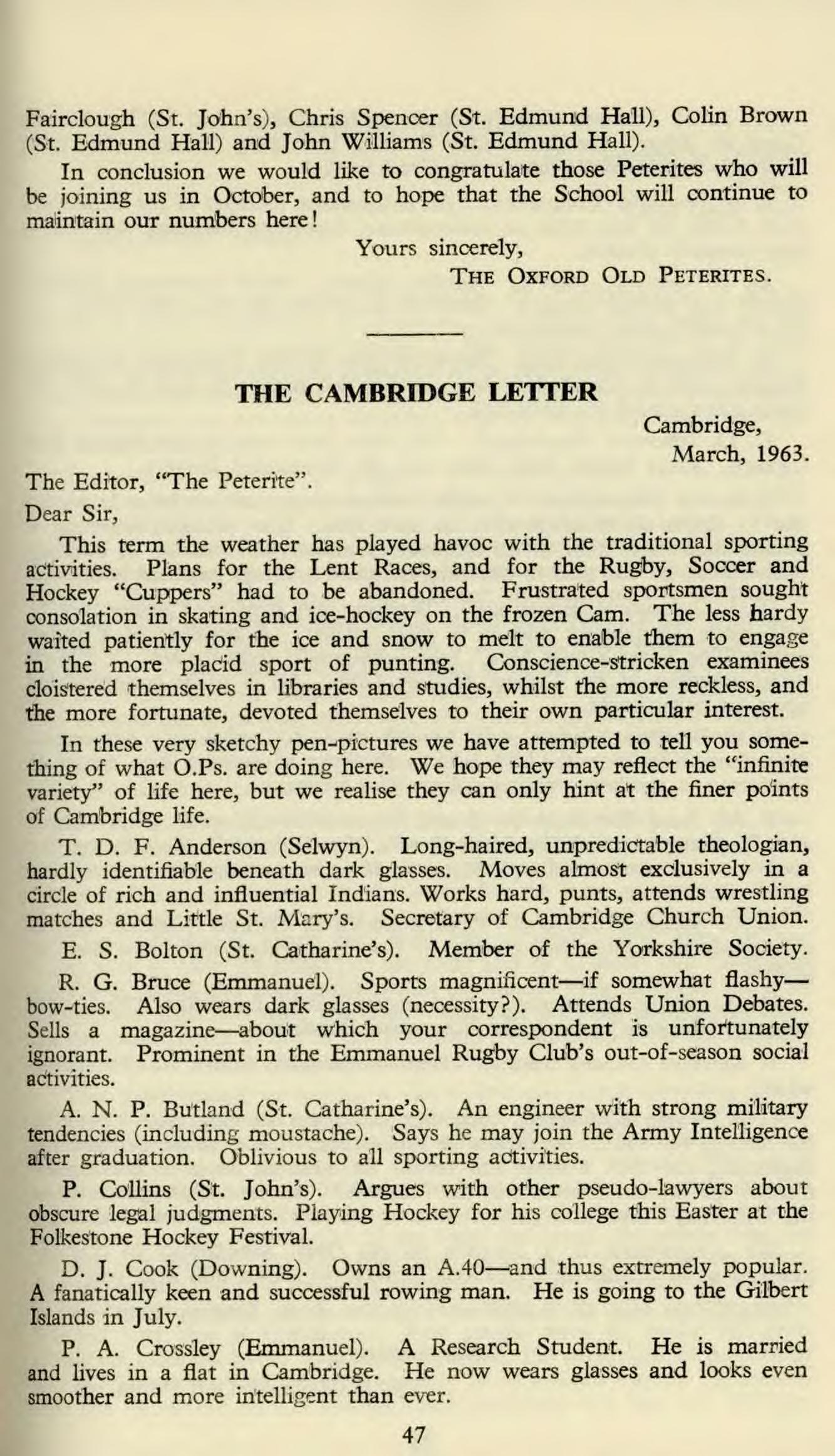
T. P. N. Fawcett (Clare). Rows in his College 2nd VIII. Attends Great St. Mary's for the Sunday Evening University Sermon. His table is always impressively littered with Greek books!
J. A. Franklin (Emmanuel). An enthusiastic member of the University Judo Club; he also edits an international Esperanto magazine and translates scientific French.
D. H. Gee (St. John's). Reading Maths., which apparently includes atomic and nuclear physics. Doubtful as to whether this will fit him for his intended career—accountancy.
G. Gildener (Churchill). Played in goal for the University Wanderers Hockey Club in one of their few matches this term. Neither Hockey nor cycling has altered his waist-line.
C. D. Ibberson (Emmanuel). Has been seen once in the Squire Law Library. Plays Bridge with Slade and the Emmanuel lawyers.
I. Kirkus (Emmanuel). Despite omission from the last letter he would like to dispel all rumours that he isn't here. The mistake, however, is understandable, in view of his frequent excursions to London. A budding philosopher, he also goes to wrestling matches. Always impeccably dressed.
T. J. D. Layfield (Emmanuel). Working very hard for Classics Part II. Still visits Manchester and is in turn visited. A member of a group called "The Tired Young Men", who occasionally meet for tea . . . ? Runs social activities of the College Hockey Club. He is to be congratulated upon his engagement.
J. R. Peverley (Christs). In his 6th year at Cambridge. Apparently supervises, rides a motor-bike, and is thinking of moving digs nearer to Homerton (a teachers training college—for women).
P. M. Read (Peterhouse). Listed his activities in order of preference and frequency thus—"The Little Rose", "the Criterion", the Cinema, the river work. Infrequently seen, so we cannot dispute or verify his statement.
E. C. Sedman (Christ's). Does Research in Natural Sciences. Sports a magnificent moustache, known to like Cambridge and often seen at parties.
D. L. Slade (Emmanuel). An accomplished ice-skater. He holds office as "Pengulu" among the Emmanuel Benchers.
P. Stuttard (Sidney Sussex). Here—presumably active . . . but doing what?
L. K. Vaigo (Downing). Another successful Rowing man. Now in his college 1st VIII. Breakfasts at lunch-time. He is to be thanked for organising the O.P. Dinner this term. In addition he is to be complimented on the resourceful way he "sheltered" his late night guests from the Downing Porter and guided them to an easy(?) route out of College.
We congratulate E. J. Lawson on his Open Scholarship in Natural Sciences at St. Catharine's and look forward to seeing him next year.
Finally, we wish the School every success in the Summer term. Yours sincerely, THE CAMBRIDGE OLD PETERITES.
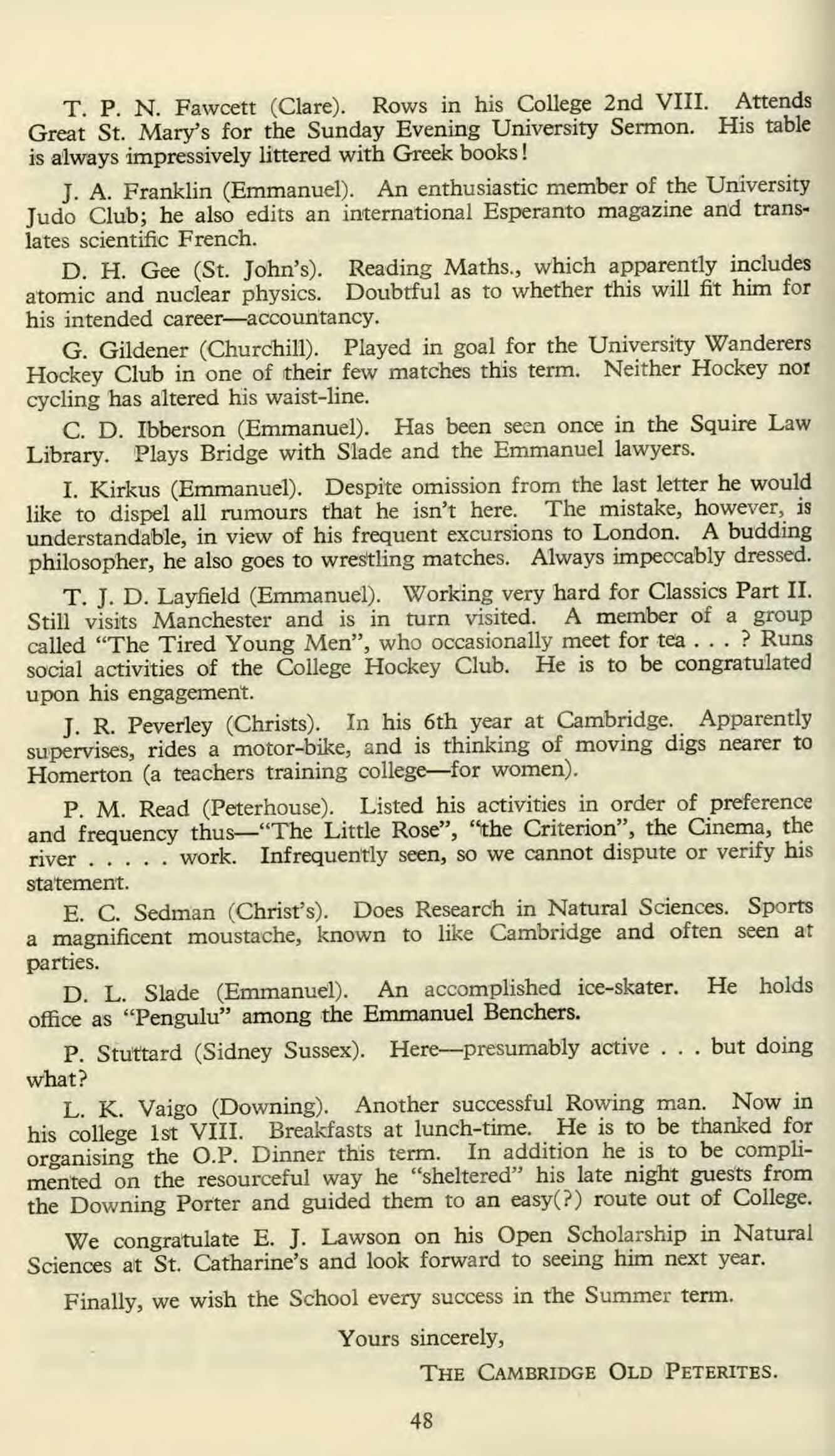
The University of London, W.C.2., Lent Term, 1963.
The Editor of the "Peterite". Dear Sir,
A first letter can be written in a sudden fit of enthusiasm : a second denotes a greater constancy of purpose. In writing this letter we are conscious of having a purpose similar to that which prompted us to write the last: there is considerable ignorance about this university, and we wish to do something to eradicate that ignorance. Therefore we will talk about this University and not about ourselves, who are still doing the things we were doing last term.
The principal purpose of going to a university must be to receive a good grounding in the subject to be studied. To achieve this it is desirable to have good teachers and a leavening of brilliant academic brains. There seems to be a belief that, whereas other universities may have adequate or even good teachers, all the great academic brains reside in Oxford or Cambridge. This is just not true. We will not lay stress on our recent crop of Nobel Prize winners, for they merely represent a small part of one faculty in one College. Over a very wide field of learning, there are here brilliant academics. It has been a constant source of surprise to us how often the best text book for our subject seems to have been written by the person who is lecturing to us and, moreover, how often it appears, from conversations with those from other universities, that our lecturer's book is the standard work. Contrary to popular belief then, sir, we find that we have here both excellent teachers and brilliant academics.
Of course, travelling is to many the great disadvantage of this University. It is true that if one is not careful a tremendous amount of time can be spent sitting on buses. However, a bit of organisation can reduce this to a fairly unimportant level, except for the keen sportsman. Most of the Colleges have their sports grounds many miles out, so that only the very keen indulge in sports that need lots of space. But, after all, one comes here to train the mind not the body and as Aristotle said "Vigorous exercise of mind and body must not be combined; each naturally works in the opposite direction from the other." One can get what is sufficient exercise for most people in one of the numerous gymnasiums or in the magnificent swimming pool in the heart of the university.
This disadvantage of having to do a little too much travelling is, we feel, outweighed by the advantage we gain from being in the capital. Whereas if a speaker is to go to any other university he is faced with a considerable journey, he can slip in here very easily indeed. The result is that we have an almost embarrassingly large number of distinguished speakers. This is a most valuable part of a university education, we believe, for it gives us the opportunity to see, hear and assess the people who are shaping our destiny. On the other hand, being part of a great city means that we cannot live in a splendid, academic isolation, somehow we seem to be continually meeting people who have nothing to do with learning alone. We feel that this is wholesome. Few people seem to realise the great advantage students have: they are accepted by the important as potentially one of themselves, and by everyone else as at present one of themselves. One can be dining with a distinguished personage one day and the next 49
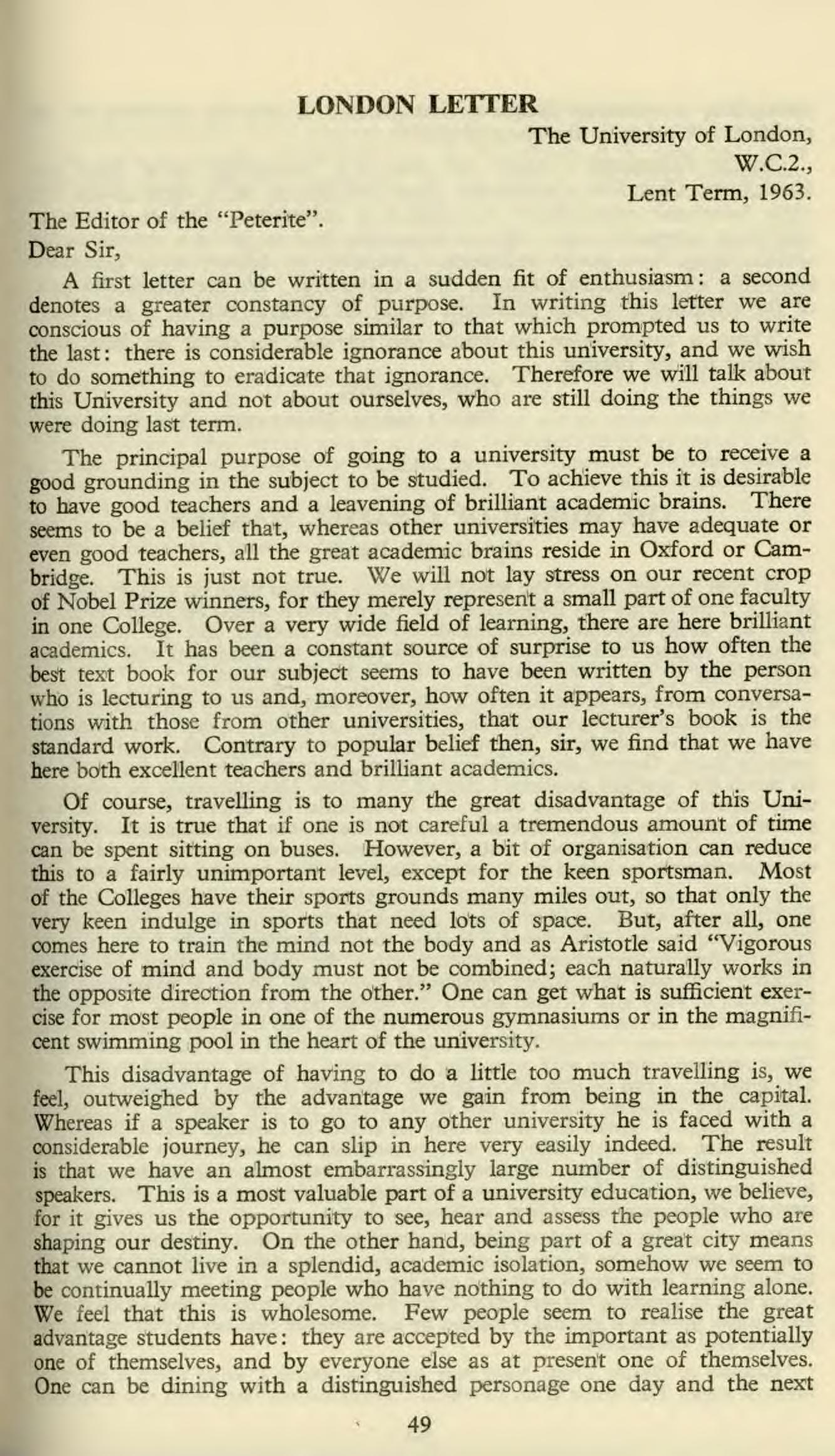
persuading a mentally defective that murder is not the solution to his problem. "Variety is the spice of life!".
In the Nineteenth Century the idea of a "university town" grew up, Heidelberg, Grenoble, Cambridge; there was felt to be in these places the right "academic atmosphere" to support a university. This is a strange, irrational, romantic idea. Why a university had to be in a dreamy, olde worlde town was never explained. Anyway we believe it is gradually becoming an out-moded concept of a university. We are convinced now of the advantages of this university being an integral part of a great city.
There is much more we could say, sir, but we think we have said sufficient for the present.
Yours sincerely,
THE LONDON UNIVERSITY OLD PETERITES.
THE WORLD OF COLONEL WARDEN By Gerald Pawle
My first introduction to the world of Colonel Warden came on a May morning in 1943. I was on my way from England to Egypt with Admiral Sir John Cunningham, the newly-appointed Commander-in-Chief, Levant, and we broke our journey at Algiers for a conference with Sir Andrew Cunningham, who was then commanding all the Allied naval forces in the Mediterranean.
When we arrived at Sir Andrew's villa and walked out onto the terrace I saw to my astonishment four men whom I had never expected to meet, and certainly not at that time and place. Winston Churchill, in his siren suit, was talking to Anthony Eden, General de Gaulle and General Georges. Speaking forcefully in his fluent but quaintly Anglicised French the Prime Minister made an unforgettable impact on a very junior officer. As I was under the impression that he was at that moment in the United States, that De Gaulle was in London and Georges a captive in Occupied France I felt I had stumbled into an unreal world, in which we might shortly be joined by President Roosevelt and perhaps even Hitler.
I had no reason then to think that 1 should meet Mr. Churchill again, but the Mediterranean was destined to remain an area of vital decisions, in most of which my Commander-in-Chief played a leading part, and consequently I was to have many further opportunities of watching from the side-lines when the Prime Minister conferred with Allied leaders—at Cairo and Tunis, at Marrakesh and Gibraltar, in Italy and Greece, and in the fateful days before Yalta. I suppose, however, that the seeds of my new book, THE WAR AND COLONEL WARDEN, were unconsciously sown during Christmas 1943, which I spent as his guest at Carthage. "Pray come and see me with your Flag Lieutenant", he had signalled to Admiral Cunningham. I had no idea where he was. After the Teheran Conference he had mysteriously vanished from the ken of all except the few who saw the highest security grade of signals and it was only on arrival at Carthage that I discovered he had been lying desperately ill with pneumonia in Eisenhower's villa on the shore of the Bay of Tunis. He had made a remarkable recovery however, and he spent most of that Christmas morning presiding vigorously over detailed discussions of the projected Allied landings at Anzio.
For everyone he had summoned to Carthage it was indeed a memorable Christmas, and watching the Prime Minister's secretariat at work, meeting members of his family and his personal staff, and gaining some insight into the vast complexity of the task of directing the war effort it was brought home to me how much drama and human interest is inevitably missed by the historian who has to rely on printed records and documents.
Readers of Smiths Trade News may recall an article I wrote about a previous book of mine, The Secret War, in which I described my days with the Wheezers 50
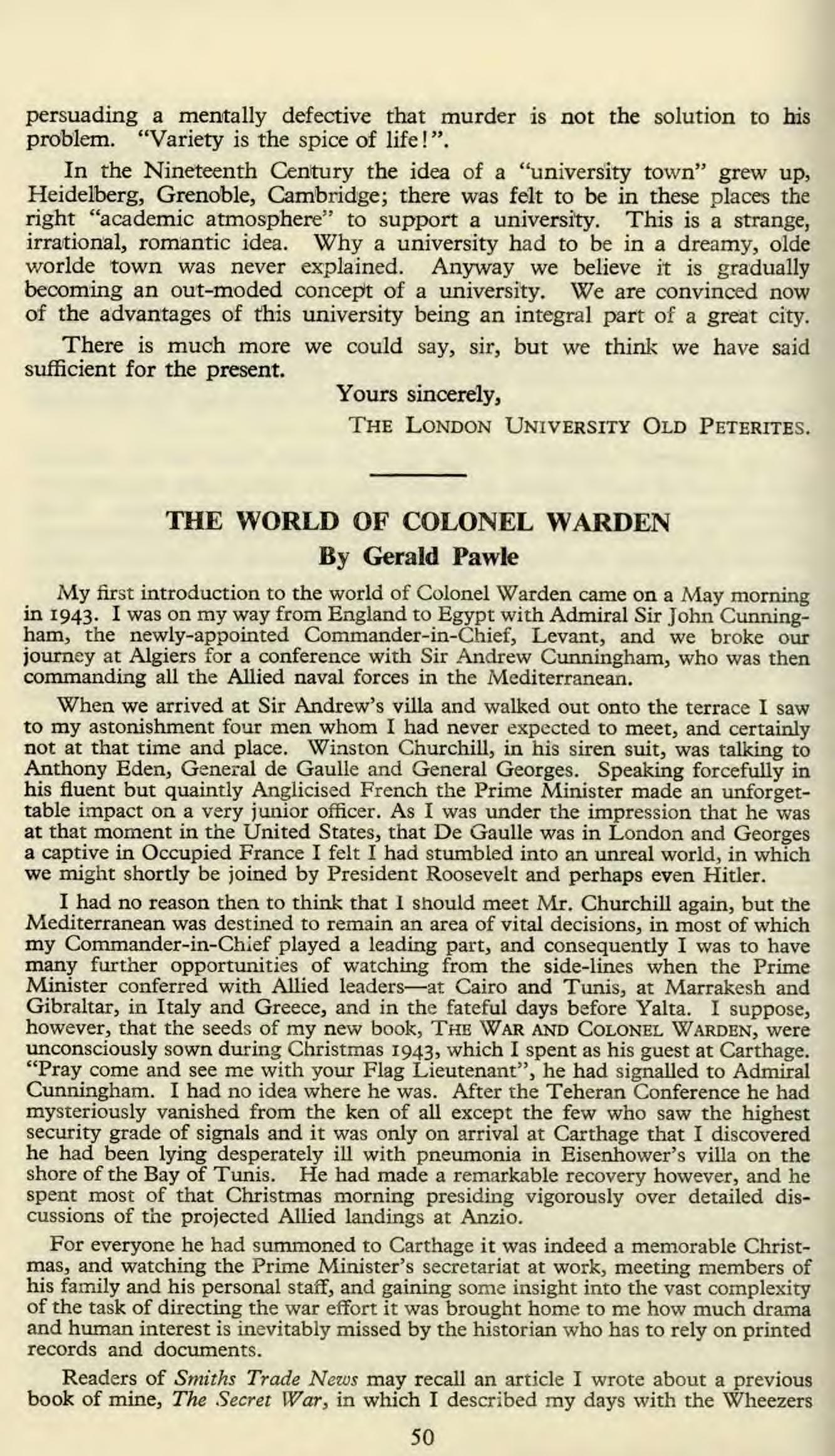
and Dodgers—the naval back-room department who produced some of the last war's most remarkable secret weapons and devices. Shortly after it was published I met, quite by chance, Commander C. R. Thompson, R.N. who had been Churchill's closest associate throughout the war years. A submarine commander who was serving at the Admiralty in 1939, he was chosen by Churchill as his Personal Assistant and thereafter he accompanied him everywhere, living with him at No. io and Chequers, organising all his journeys, and remaining by his side until the moment when he finally left Downing Street in 1945. When Churchill was returning from the first Washington Conference in 1942 "Tommy" Thompson had to be left behind at Bermuda as the passenger list of the flying boat was drastically pruned to make room for extra fuel. "Never before and never afterwards were we separated", wrote Churchill later.
I suggested to Thompson that he should tell his story of those momentous days, and when he sought Sir Winston's approval it was given immediately. So we set to work, turning my Cornish study into something which rather resembled the Prime Minister's Map Room, and to fix dates and events firmly in mind I built up a vast wall chart showing every day of the war, with Churchill's own movements in blue ink and world events in red. Onto this chart went some 5,000 entries, including the names of visitors to Chequers, information about bombing raids and Commando attacks, Allied Conferences in many parts of the world, and all the Prime Minister's journeys by land, sea, and air.
The project grew and grew. To supplement Tommy's own recollections I talked to more than sixty others whose wartime service brought them closely in touch with the Prime Minister. One enthralling evening I spent listening to Captain Roger Lewis, D.S.O., R.N., describing how he and Commander Ouvry took the first magnetic mine to pieces on the mudflats at Shoeburyness; on another occasion I drove at breakneck speed in a police car—a machine gun on my lap—to a lonely lough in Northern Ireland to talk to Sir Richard Pim, one-time head of Churchill's Map Room and later a target for I.R.A. gunmen when he took command of the Royal Ulster Constabulary. There were interviews as far afield as Spain and Morocco and even Cape Town, and at the end of my researches I had some 1,200 pages of raw material, which I had to cut down to 167,000 words.
Many books have been written about the last war and the part which Sir Winston played in it. Most of them, however, have dealt mainly with the political or military aspects of the war. What I have tried to do in this book is to fill in some of the gaps, concentrating in particular on the Prime Minister's life, day by day, as he directed the war effort, and his journeys throughout the world. There was the time when he disguised himself in a red beard; the time when he, Smuts and Montgomery miraculously escaped being mown down by German paratroopers hiding in a rhododendron bush. You can read about extraordinary devices which Churchill took a close interest in, like White Rabbit No. 6 and the Floodlight Tank on the Cumbrian fells; the story of the seasick apes, and the meeting with Ibn Saud when sheep were sacrificed in a hotel bedroom.
Averell Harriman, Roosevelt's special envoy to Britain and now President Kennedy's representative at U.N.O. has written a long and interesting foreword. He strongly disagrees with some of my conclusions, but perhaps this is not surprising.
I have dedicated The War and Colonel Warden to the two great naval leaders who held the Allied Command in the Mediterranean. My greatest regret is that Admiral of the Fleet Sir John Cunningham, who gave me my first insight into the world of Colonel Warden, has not lived to read the story, for which he gave me so much ungrudging help.
